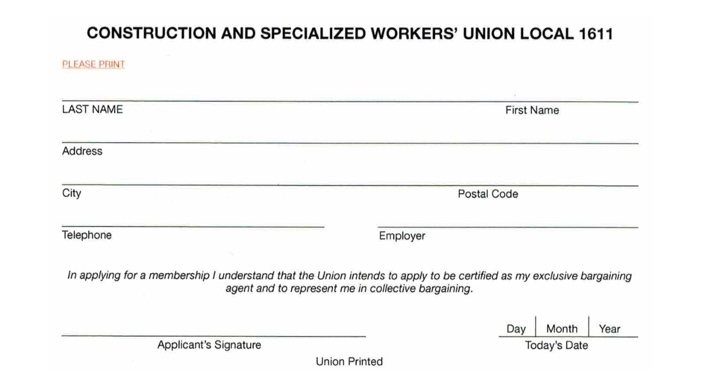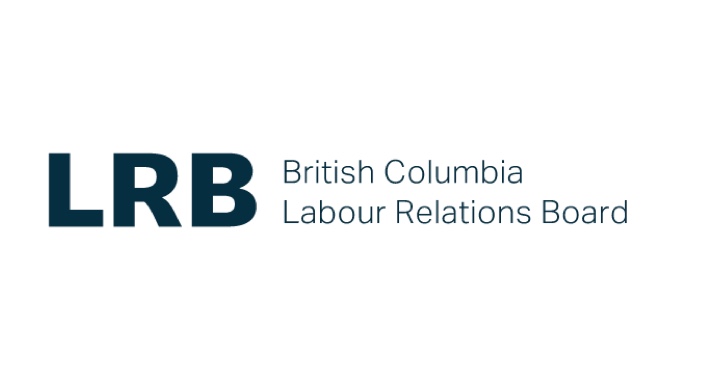Join
LiUNA 1611
UEM workers are trying to unionize with LiUNA! Now is your chance to unite with your co-workers at UEM to form a union and gain a voice at work to make the improvements you all want!
How to form a Union
Forming a union is a worker’s legal right under Canadian Charter of Rights and Freedoms, and there is a legal process that workers must follow to do so. That process looks like this:

Get in touch with an organizer
The first step is to get in touch with a union organizer! Your organizer will work with you on a winning strategy, answer your questions, and address any concerns. Think of them as your all around support throughout the process.

Sign a
union card
A majority of workers must sign a confidential union card to advance the process. Signing a union card is like signing a petition. The more people who sign, the more powerful your demands for change will be.

File for union certification
a) If 45-55% of the workforce have signed on, the Labour Board will conduct an election.
b) If over 55% of the workforce signed up, there is no need for a certification vote, and workers move on to bargaining.
Frequently Asked Questions
LiUNA was contacted by some of your co-workers who asked us to assist them in gaining the power to negotiate long-lasting improvements to their jobs, which is achieved by becoming unionized.
LiUNA organizers worked with a group of supervisors who no longer work for UEM.
However, unionizing is still possible if new UEM workers are prepared to step up to make it happen.
Unions are about workers coming together to improve their jobs and workplace culture. Nobody should have to put up with unfairness, but it isn’t easy to stand up to management on your own! Unions bargain with employers on behalf of members and negotiate fair labour contracts. They have a democratic structure with leaders elected from the membership. They are organizations made up of working people for working people.
No, your employer will never see or find out who signed the cards, just as they will never know if you voted. The entire process is designed by the government to be anonymous.
Without a union, your employer has 100% of the decision-making power. With a union, you bring democracy into your workplace and force your boss to negotiate all of your working conditions with you and your co-workers as equals.
Your union rep will also ensure your employer abides by what was negotiated. If not, we can take them to court on your behalf. With a union, you’ll never be alone when dealing with management!
If employees decide to use their legal right to become unionized, you will gain the ability and power to negotiate all of your working conditions. Below are a few examples of improvements we can work towards together:
- Gain the power to negotiate all working conditions as an equal. With a union, you have 50% of the decision-making power!
- Create a fair and transparent wage scale with pre-approved, hassle-free wage increases.
- Assistance to stop unlawful surveillance of employees by owners.
- Gain a union support system of union reps, stewards, lawyers and WCB advocates to assist employees with workplace issues. With a union, you’ll never be alone when dealing with management.
- Just Cause Protection – Remove the employer’s ability to terminate employees without just cause and have a team behind you to fight back whenever it happens again (at no additional cost).
- Start accepting TIPS!
- Start getting direct deposit instead of cheques.
- Scheduling – With a union, you can influence how the schedule is written and how much advance notice you’ll be guaranteed.
- Start to receive paid breaks.
- Gain a voice that must be respected and listened to by management.
There is no cost to join until your first collective agreement is voted in by UEM employees.
Once you start benefiting from unionizing, your monthly union dues are no more than $8.50 per week, and working dues (cents per hour worked) vary depending on your wage. Because LiUNA is a non-profit organization, your union dues are also 100% tax-deductible. The higher wages, rights and benefits that come with unionization are well worth the small cost associated with participating!
The way the legal process works is that every employee affects a workplace’s ability to become unionized. So if you leave, you won’t directly benefit, but you will be helping your co-workers gain the power to improve their jobs, giving you lots of karma points.
No. It is illegal for employers to fire workers for trying to join a union. Under the BC Labour Relations Code, all workers have the right to join a union without fear of reprisals from their employer. If you are worried about retaliation from your employer, know that we will have your back.
The best person to contact is Keith Murdoch on his cell phone: 604.328.8123 or email him at kmurdoch@cswu1611.org
The Union Advantage
-
Better Wages & Equal Pay
- Bargaining Power & Representation
- Improved Safety
- Health and Dental Benefits & Retirement Security
- Job Security & Fair Scheduling
On average, unionized workers earned $5.12/hour more than non-union employees. And for women in unions, who are traditionally paid less by non-union corporations, you earn roughly $6.91/hour more. This ensures that all workers doing the same work, regardless of their gender identity, are being paid fairly.
Local 1611 strives to negotiate Collective Agreements that provide a fair wage and guaranteed, pre-negotiated raises. You’ll never have to ask for a raise again, eliminating favouritism and managerial discrimination. This advantage extends: – Youth: Earn $3.16/hour more when you unionize. – Indigenous People: Earn $6.51/hour more when you unionize. – New Immigrants: Earn $3.97/hour more when you unionize.
When workers unionize, they gain the power to negotiate with their employer collectively instead of individually. Collectively you can negotiate better wages, health and retirement benefits, fair work schedules, job security and overall improved workplace conditions.
LiUNA members also have a support network made up of Union Reps, Stewards, WCB Advocates, and Lawyers to help protect and ensure your fair treatment.
Many non-union workers are scared to point out safety concerns in the workplace as they are fearful of discipline or being labelled as troublemakers. This isn’t a concern in unionized workplaces, which is why unionized workplaces are safer.
Unionized workers have a 25% lower rate of injury. With a union, workers can hold their employer accountable for their safety in the workplace without any fear of being punished.
If a LiUNA member does get injured at work, you’ll have access to a WCB Advocate that will help you through the process of getting compensation.
Covered members and their dependents have health benefits such as extended healthcare, dental care, drug coverage, and life insurance. Members can also negotiate a pension plan or RRSP match into their collective agreement, depending on their priorities. These benefits can’t be changed without workers’ approval, unlike in a non-unionized workplace.
Forming a union is a worker’s best way to get job security. Unionizing removes the employer’s ability to terminate workers without just cause and creates a dispute resolution process that promotes a fair and respectful work environment.
On average, unionized workers earned $5.12/hour more than non-union employees. And for women in unions, who are traditionally paid less by non-union corporations, you earn roughly $6.91/hour more. This ensures that all workers doing the same work, regardless of their gender identity, are being paid fairly.
